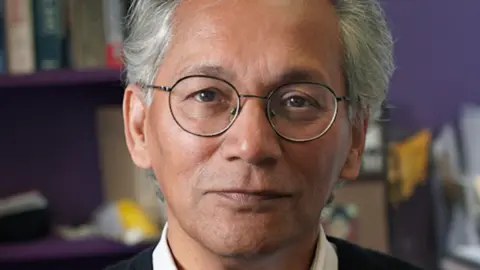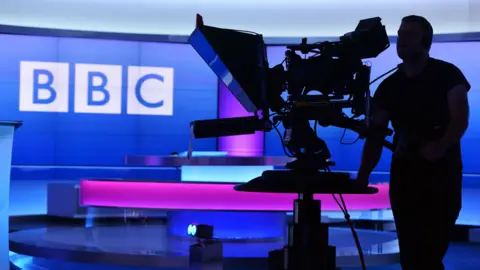Samir Shah: TV executive is government's choice for new BBC chairman
 PA Media
PA MediaTV executive Samir Shah has been named as the government's choice for the new BBC chairman, following Richard Sharp's resignation in April.
Dr Shah, 71, previously held a series of roles at the BBC, including as its head of current affairs.
In a statement, he said he was "delighted" to have been named the government's preferred candidate.
Mr Sharp resigned earlier this year after breaking rules over dealings with Boris Johnson ahead of his appointment.
Professor Dame Elan Closs Stephens, a BBC board member, stepped in as acting chairwoman following his exit.
Although the BBC is politically independent, its chairperson is appointed by the government.
Culture Secretary Lucy Frazer said Dr Shah had "a wealth of experience to bring to the position".
"He has a clear ambition to see the BBC succeed in a rapidly changing media landscape, and I have no doubt he will provide the support and scrutiny that the BBC needs to meet the challenges and opportunities of the future," she added.
The DCMS select committee will need to approve ministers' choice for chairperson, before it is sent to the privy council and the King for approval.
Dr Shah said: "The BBC is, without doubt, one of the greatest contributions we have made to global culture and one of our strongest calling cards on soft power.
"The BBC has a great place in British life and a unique duty to reach a wide audience right across the country and I will do all I can to ensure it fulfils this in an increasingly competitive market."
As chairman of the BBC's board, Dr Shah will be in charge of upholding and protecting the BBC's independence and ensuring the BBC fulfils its mission to inform, educate and entertain.
He will also lead negotiations with the government over the future of the licence fee.
A BBC spokesperson said: "We welcome the announcement that Samir Shah has been selected as the government's preferred candidate to take up the role of BBC chair and look forward to him joining the board once the formal process has been completed."
His selection marks a sea change, as it means there will now be a journalist at the top of the BBC.
Dr Shah has worked in TV for more than 40 years, starting at London Weekend Television in 1979.
Since then, he has held positions as the BBC's head of television current affairs, and later went on to head the corporation's political journalism across radio and television.
In 2007, he was appointed as a non-executive director on the BBC Board.
Dr Shah is currently chief executive of Juniper, an independent production company, which supplies programmes to the BBC, as well as other organisations including Channel 4, Netflix and National Geographic.
The announcement that Dr Shah was the preferred candidate was broadly welcomed on social media, with broadcaster Andrew Neil describing him as "superb" choice.
"He's a brilliant broadcaster. Smart, focused, across the issues, fiercely independent. I wish him all good fortune in the job," he added.
Journalist Liam Halligan said Dr Shah was "hugely talented", adding: "While he rightly champions on- and off-screen diversity, it is my experience that Samir truly values cognitive diversity as well."
Dr Shah's half-brother is Mohit Bakaya, the controller of BBC Radio 4.

His appointment comes at a challenging time for the BBC, which is looking to make £500m of savings in the face of high inflation and a two-year freeze to the cost of a TV licence.
The licence fee, which provides most of the BBC's funding, is currently £159 but is due to rise in April in line with inflation.
On Monday, Culture Secretary Lucy Frazer said an increase to the fee by almost £15 would "absolutely" be too much.
She also said she was looking at how "we fund the BBC going forward".
The licence fee is due to stay in place until at least 2027, when the BBC's Royal Charter ends, with a debate taking place about how the broadcaster should be funded after that.
Last week, the BBC announced it was cutting back BBC Two's Newsnight programme, in what the National Union of Journalists described as a "major blow to investigative news".
The long-running show will lose its dedicated reporters, be shortened by 10 minutes and drop its investigative films to focus on studio-based debates.
Mr Sharp, who previously worked at Goldman Sachs, resigned earlier this year after his communication with former Prime Minister Boris Johnson was scrutinised.
A report published in April found Mr Sharp created the appearance of a conflict of interest by not fully disclosing his knowledge of the ex-PM's personal finances.
It emerged Mr Sharp tried to facilitate a high-level government meeting for a businessman offering Mr Johnson financial help.
Mr Sharp defended his conduct but said he did not want to be a distraction.
